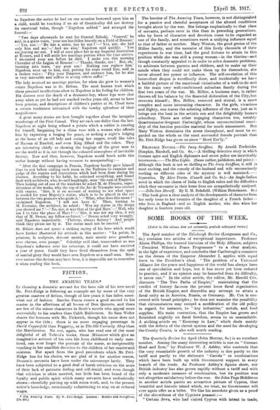FICTION.
THE AMAZING YEARS.*
Is choosing a domestic servant for the beau role of his new novel Mr. Pett-Ridge is following an example set by some of the very greatest masters of fiction, though of late years it has fallen some- what out of fashion. Sancho Parma comes a good second to his master in the affections of all lovers of Don Quixote, and there are few of the minor characters in Scott's novels who appeal more successfully to his readers than Caleb Balderston. So Sam Weller shares the honours with Mr. Pickwick, though his name does not appear in the title ; there is no more engaging personage in David Copperfield than Peggotty, or in The Old Curiosity Shop than the Marchioness. No one, again, who has road one of the most delightful of all Tolstoi's books, those Minwiree which give an imaginative account of his own life from- childhood to early man- hood, can ever forget the portrait of the nurse, so inexpressibly touching in her unselfish devotion to the children of her master and mistress. But apart from the good precedents which Mr. Pett- Ridge has for his choice, we are glad of it for another reason. Domestic servants have been under the microscope lately. They have been subjected to a good deal of harsh criticism on the score of their lack of patriotic feeling and self-denial, and even though that criticism is often merited, too little has been heard of the loyalty and public spirit which many servants have undoubtedly shown—cheerfully putting up with extra work, and, to the present writer's knowledge, occasionally volunteering to stay on at reduced wages.
• The Anic.-ing Years. By W. rett-Bidge. London Hodder and Stoughton, (55. net.' The heroine of The Amazing Years, however, is not distinguished for a passive and cheerful acceptance of the altered conditions; brought about by the war. She belongs emphatically to that class of servants, perhaps rarer in this than in preceding generations, who by force of character and devotion come to be regarded as one of the family, and sometimes exert a unifying influence equal to that of father or mother. Mary Weston, the good genius of the Hillier family, and the narrator of this lively chronicle of their experiences in war time, had the good fortune to attain to this position while she was still a young woman—in the thirties—and though constantly appealed to in order to solve domestic problems, to arbitrate between parents and children, and to make up their minds when they could not make them up for themselves, she never abused her power or influence. The self-revelation of this benevolent despot is excellently done, and incidentally we have a faithful picture of the emotional vicissitudes of a well-to-do and in the main very well-conditioned suburban family during tbe first two years of the war. Mr. Hillier, a business man, is rather thrown off his balance by the financial dislocation of the City, but recovers himself; Mrs. Hillier, reserved and stoical, is a more complex and more interesting character. In the girls, vivacious and flighty, one traces the sobering influence of the war, just as it brings out the best in the artistic son and the delightfully human- schoolboy. There are other engaging characters too, notably Quartermaster-Sergeant Cartwright, whose unconventional court- ship of the heroine provides material for much amusement. But Mary Weston dominates the scene throughout, and must be re- garded on the whole as the most successful female portrait that Mr. Pett-Ridge has given us since " Mord Einly."


































 Previous page
Previous page